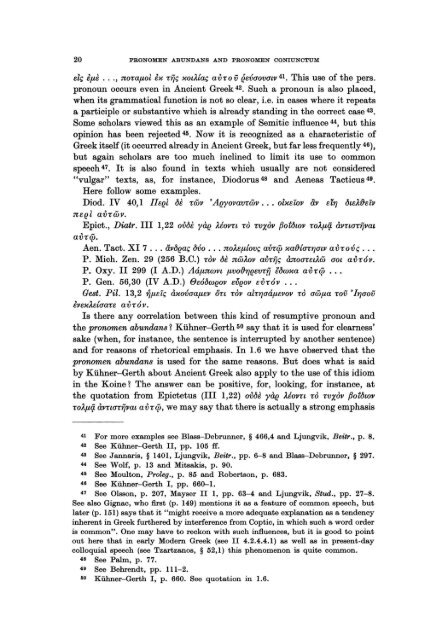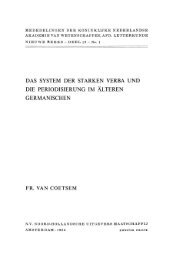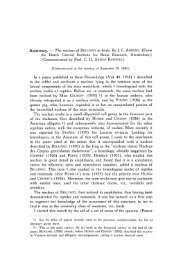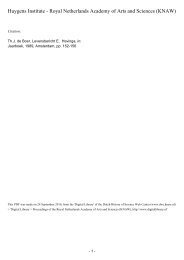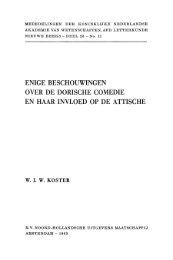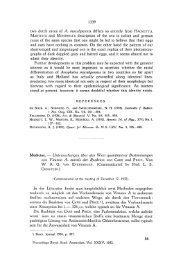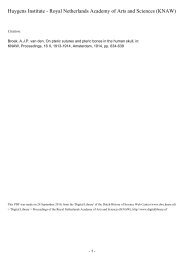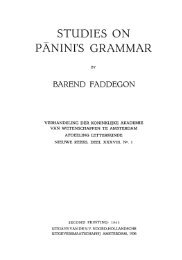Pronomen Abundans and Pronomen Coniunctum. A ... - DWC
Pronomen Abundans and Pronomen Coniunctum. A ... - DWC
Pronomen Abundans and Pronomen Coniunctum. A ... - DWC
You also want an ePaper? Increase the reach of your titles
YUMPU automatically turns print PDFs into web optimized ePapers that Google loves.
20 PRONOMEN ABUNDANS AND PRONOMEN CONIUNCTUM<br />
elç ÈJ-lè ... , 7w-raJ-lOi È" 7:fjç "otAlaç aV7:0V éevO'ovO't'P 41 • This use of the pers.<br />
pronoun occurs even in Ancient Greek 42. Such a pronoun is also placed,<br />
when its grammatical function is not so clear, i.e. in cases where it repeats<br />
a participle or substantive which is already st<strong>and</strong>ing in the correct case 43.<br />
Some .scholars viewed this as an example of Semitic influence 44, but this<br />
opinion has been rejected 45. Now it is recognized as a characteristic of<br />
Greek itself (it occurred already in Ancient Greek, but far less frequently 46),<br />
but again scholars are too much inclined to limit its use to common<br />
speech 47. It is also found in texts which usually are not considered<br />
"vulgar" texts, as, for instance, Diodorus 48 <strong>and</strong> Aeneas Tacticus 49.<br />
Here follow some examples.<br />
Diod. IV 40,1 IIeei éJè nvv > Aeyovav7:wv ... ol"ûov av et'fj éJte).f)eiv<br />
:7teei aV7:wv.<br />
Epict., Diatr. III 1,22 ovéJè yàe UOV7:t 7:0 7:VXOV {JotéJwv 7:0AJ-lfi. àv7:tO'7:fjva,<br />
av7:Cp.<br />
Aen. Tact. XI 7 ... avéJeaç éJVo ... :7toAeJ-llovç avnp "afHO'7:'fjO't'P aV7:ovç ...<br />
P. Mich. Zen. 29 (256 B.C.) 7:0V bè :7tWAOV aV7:fjç MOO'UtAW O'Ot aV7:6v.<br />
P. Oxy. II 299 (I A.D.) AáJ-l:7twvt J-lvo-&rje8V7:fi léJw"a aV7:qJ .••<br />
P. Gen. 56,30 (IV A.D.) ee6éJweov eveov eV7:6v ...<br />
Gest. Pil. 13,2 ijJ-lÛç à'XoVO'aJ-lev 87:t 7:0V ah'fjO'áJ-levov 7:0 O'wJ-la 7:0V > I'fjO'ov<br />
Ève'XAelO'au a V 7: 6 v.<br />
Is there any correlation between this kind of resumptive pronoun <strong>and</strong><br />
the pronomen abundans ? Kühner-Gerth 50 say that it is used for clearness'<br />
sake (when, for instance, the sentence is interrupted by another sentence)<br />
<strong>and</strong> for reasons of rhetorical emphasis. In 1.6 we have observed that the<br />
pronomen abundans is used for the same reasons. But does what is said<br />
by Kühner-Gerth about Ancient Greek also apply to the use of this idiom<br />
in the Koine? The answer can be positive, for, looking, for instance, at<br />
the quotation from Epictetus (lIl 1,22) ovéJè yà(! UOll7:t 7:0 7:VXOV {JotéJtOll<br />
7:0AJ-lfi. àll7:tO'7:fjllat aV7:qJ, we may say that there is actually astrong emphasis<br />
41 For more examples see Blass-Debrunner, § 466,4 <strong>and</strong> Ljungvik, Beitr., p. 8.<br />
42 See Kühner-Gerth I1, pp. 105 ff.<br />
43 See Jannaris, § 1401, Ljungvik, Beitr., pp. 6-8 <strong>and</strong> Blass-Debrunner, § 297.<br />
44 See Wolf, p . 13 <strong>and</strong> Mitsakis, p. 90.<br />
45 See Moulton, Proleg., p . 85 <strong>and</strong> Robertson, p. 683.<br />
46 SM Kühner-Gerth I, pp. 66(}-1.<br />
47 See Olsson, p. 207, Mayser II 1, pp. 63-4 <strong>and</strong> Lj ungvik , Stud., pp. 27-8.<br />
See also Gignac, who first (p. 149) mentions it as a feature of common speech, but<br />
later (p. 151) says that it "might receive a more adequate explanation as a tendency<br />
inherent in Greek furthered by interference from Coptic, in which such a word order<br />
is common". One may have to reckon with such influences, but it is good to point<br />
out here that in early Modern Greek (see II 4.2.4.4.1) as weIl as in present.day<br />
colloquial speech (SM Tzarlzanos, § 52,1) this phenomenon is quite common.<br />
48 See Palm, p. 77.<br />
49 See Behrendt, pp. 111-2.<br />
50 Kühner-Gerth I, p. 660. See quotation in 1.6.


